January 15th, 2009 by Eugene Barsky | No Comments »
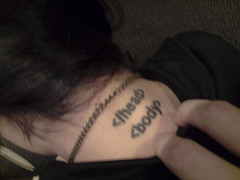
The US National Security Agency has helped put together a list of the world’s most dangerous coding mistakes.
Experts from more than 30 US and international cyber security organizations jointly released the consensus list of the 25 most dangerous programming errors that lead to security bugs and that enable cyber espionage and cyber crime. Shockingly, most of these errors are not well understood by programmers; their avoidance is not widely taught by computer science programs; and their presence is frequently not tested by organizations developing software for sale.
BBC news article lists the mistakes here – http://news.bbc.co.uk/2/hi/technology/7824939.stm
** Photo by Marco Gomes
Posted in Amusing stuff, Main, Mathematics, News, Science - undegraduate classes | No Comments »
January 5th, 2009 by Eugene Barsky | No Comments »
The 2008 edition of this ever popular video is out for the masses.
I enjoyed to view it for the first time a couple of years ago and I have to admit that the video did not change much.
However, it might still surprise and entertain you:
Posted in Amusing stuff, Main | No Comments »
December 12th, 2008 by Kevin Lindstrom | No Comments »
Interested in what’s going on at Google? There are a number of ways of doing this. Going to Google Labs will show you some of their cool new technologies.
What else is going on at Google? Searching the ACM Digital Library for Google in the Affiliations field retrieves 359 papers. The most recent being Programming the Intel 80-core network-on-a-chip terascale processor. A paper presented at the of the 2008 ACM/IEEE Conference on Supercomputing held in Austin, Texas.
Another good database to look at is Compendex. Repeating the same affiliation search in Compendex retrieves 278 papers. The most recent article in Compendex is A New Baseline for Image Annotation published in Springer Lecture Notes in Computer Science, volume 5304, pages 316-329, 2008.
Okay. Let’s look at how Google protects its intellectual property. A search of the Google Patents database for Google in the assignee name field retrieves 100 patents/patent applications with the most recent US patent 7,352,833 Method and System for Temporal Autocorrelation Filtering being published on May 8, 2008.
Repeating the same search in Espacenet retrieves over 1675 patents/patent applications with most recent patent/patent application US 20080301093 A1 Determining Search Query Statistical Data for an Advertising Campaign Based on User-Selected Criteria published on December 4, 2008.
Okay, here’s the challenge. Use Google Scholar find the most up-to-date recent articles, patents/patent applications written by researchers at Google. Let me know what you find and how easy it was.
Moral of the story. There is something to be said for databases such as Compendex, Web of Science and Scifinder Scholar that index thousands of journals and conference proceedings and have sophisticated search interfaces that allow you – the end user to find exactly what you are looking for.
Submitted by Kevin Lindstrom Kevin Lindstrom Liaison Librarian for Electrical and Computer Engineering, Earth and Ocean Sciences, Chemistry and Chemical Engineering, Materials Engineering, Physics and Astronomy, and Physical Geography.
Posted in Amusing stuff, Atmospheric Science, Chemical and Biological Engineering, Chemistry, Civil Engineering, Earth and Ocean Sciences, General Science, Geography, Main, Materials Engineering, Mathematics, Mechanical Engineering, News, Physics, Science - undegraduate classes, Statistics, Wood Sciences | No Comments »
November 12th, 2008 by Eugene Barsky | No Comments »
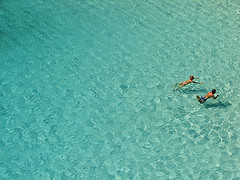
A major new global prize celebrating the work of both professional and amateur photographers has been awarded in Paris.
The Prix Pictet is the first competition of its type to focus on the global issue of ‘sustainability’ – and, this year in particular, on water.
The winner of 100,000 Swiss francs (£53,000) is the Canadian photographer Benoit Aquim.
Here is the BBC audioshow with the celebrated works – http://news.bbc.co.uk/2/hi/entertainment/7700551.stm
** Photo by visualpanic
Posted in Amusing stuff, Atmospheric Science, Earth and Ocean Sciences, Main, News, Science - undegraduate classes | No Comments »
October 22nd, 2008 by Eugene Barsky | No Comments »
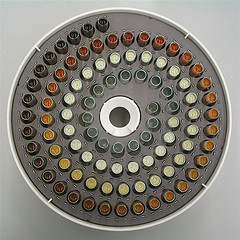
An interesting short read from the BBC Science section talks about Stanley Miller’s chemical experiments – http://news.bbc.co.uk/2/hi/science/nature/7675193.stm
The BBC piece refers to the this article published a few days ago in Science –
The Miller Volcanic Spark Discharge Experiment. Adam P. Johnson, H. James Cleaves, Jason P. Dworkin, Daniel P. Glavin, Antonio Lazcano, and Jeffrey L. Bada (17 October 2008). Science 322 (5900), 404. [DOI: 10.1126/science.1161527]
** Photo by tz1_1zt’
Posted in Amusing stuff, Chemical and Biological Engineering, Chemistry, Main, News, Science - undegraduate classes | No Comments »
September 12th, 2008 by Kevin Lindstrom | No Comments »
We’ve got ebooks on almost any topic under the sun and pdf’s are a lot lighter to carry than paper.
You want books on how to write code in Python or how to fix your new laptop running Microsoft Vista? Have a look at the Books 24X7 IT Collection.
Trying find some good stuff on biodiesel? Heres’ a hot title
Biodiesel – A Realistic Fuel Alternative for Diesel Engines
Need some physical property data like the viscosity of Cl2 gas? A search of Knovel.com will link you to the Chemical Properties Handbook and Yaws’ Handbook of Thermodynamic and Physical Properties of Chemical Compounds
Need some good information on climate change? Here’s a good starting point Assessing Climate Change.
Circuit diagrams for operational amplifiers? Check out the Electrical Engineering Handbook.
All in all, you have access to more than five thousand science and engineering ebooks.
For a complete list (not including Books24X7 titles) go to the Science & Engineering Ebook site. There you can find A-Z titles lists of ebooks as well as the search interfaces for the ebook collections you have access to. Make sure you look at the Springer Ebooks as well. Springer is a major science and engineering publisher.
Remember that these resources are not freely available on internet, so if you are connecting from off campus, go to UBC’s VPN site for instructions.
Posted by Kevin Lindstrom Liaison Librarian for Earth and Ocean Sciences, Chemistry and Chemical Engineering, Electrical and Computer Engineering, Materials Engineering, and Physics.
Posted in About this blog, Amusing stuff, Atmospheric Science, Chemical and Biological Engineering, Chemistry, Civil Engineering, Earth and Ocean Sciences, General Science, Geography, Main, Materials Engineering, Mathematics, Mechanical Engineering, News, Physics, Podcasts, Science - undegraduate classes, Statistics, Wood Sciences | No Comments »
September 5th, 2008 by Kevin Lindstrom | No Comments »
Nothing like a juicy headline to catch your attention! From this week’s edition of Science
“The doom mongers do have one thing right: The LHC just might create black holes. According to Einstein’s theory of general relativity, energy warps space and time. So by smashing protons together with unprecedented vigor, the LHC might cram enough energy into a small enough volume to create pinholes in the universe–miniature black holes. If space has three dimensions, even the energies reached by the LHC will be about a million billion times too low. However, string theory–which assumes that every fundamental particle is in fact an infinitesimal vibrating string–predicts that space has more dimensions curled into tiny loops. If some of them are curled loosely enough, then the energy threshold may tumble to within the LHC’s reach, some theorists have argued.”
Also have a look at
LARGE HADRON COLLIDER: The Overture Begins
Science 321 (5894), 1287. [DOI: 10.1126/science.321.5894.1287]
LARGE HADRON COLLIDER: Researchers, Place Your Bets!
Science 321 (5894), 1288. [DOI: 10.1126/science.321.5894.1288]
LARGE HADRON COLLIDER: Bracing for a Maelstrom of Data, CERN Puts Its Faith in the Grid
Science 321 (5894), 1289. [DOI: 10.1126/science.321.5894.1289]
Submitted by Kevin Lindstrom@ubc.ca Physics Liaison Librarian
Posted in Amusing stuff, General Science, News, Physics | No Comments »
August 27th, 2008 by Eugene Barsky | No Comments »
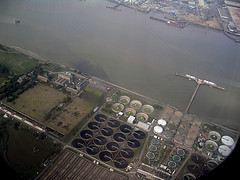
Here is the NYT article from August 10, 2008 that discusses water-recycling plants. An interesting lunch-time read.
We have hundreds of books on the topic, not to mention ebooks or electronic databases… Check out the following two links:
1. Water–Purification (almost 200 books)
2. Sewage–Purification. (almost 200 books)
Moreover, we have a couple of online books about the topic, for instance – “Handbook of water and wastewater treatment technologies” from Knovel. Check those out!
** Photo by elbisreverri
Posted in Amusing stuff, Chemical and Biological Engineering, Earth and Ocean Sciences, Main, Mechanical Engineering, News, Science - undegraduate classes | No Comments »
August 11th, 2008 by Eugene Barsky | No Comments »
By Katherine McAlpine and a few more folks @ CERN.
They do a very nice and concise Rap explanation what LHC does – I loved it…Please see it below 🙂
CERN Rap from Will Barras on Vimeo.
Posted in Amusing stuff, Earth and Ocean Sciences, General Science, Main, Physics, Science - undegraduate classes | No Comments »
July 31st, 2008 by Eugene Barsky | No Comments »
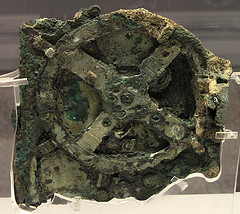
The New York Times has an article today about an ancient Greek technology known as the Antikythera Mechanism
A very interesting read indeed – Discovering How Greeks Computed in 100 B.C.
The NYT article cites a letter published in Nature today –
Freeth, T; Alexander, J, Steele, JM, Bitsakis, Y (July 31, 2008). “Calendars with Olympiad display and eclipse prediction on the Antikythera Mechanism“. Nature 454: 614–617.
** Photo from – http://www.flickr.com/photos/ethanhein/
Posted in Amusing stuff, General Science, Main, Mathematics, News, Science - undegraduate classes, Statistics | No Comments »





